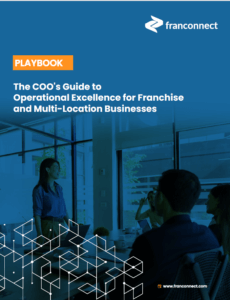Only 16% of franchisors make it to 100 locations. The culprit? Poor technology decisions are behind this staggering failure rate.
Most franchise brands struggle not because they lack software, but because they’ve chosen the wrong software or the wrong partners. When quality control management software fails across multiple locations, or operations management software creates more problems than it solves, the consequences multiply exponentially across your entire network.
These aren’t simple procurement decisions. They’re strategic investments that determine whether your franchise operates smoothly across multiple locations or becomes bogged down in operational chaos.
The choices you make today about technology partnerships, integration strategies, and scalability will define whether your franchise thrives or joins the 84% that never reach their growth potential.
The Costly Myths Killing Franchise Technology ROI
Three dangerous myths are sabotaging franchise technology investments, creating expensive barriers to growth that compound across every location in your network.
Myth 1: “The cheapest option saves money.” This thinking transforms initial savings into expensive liabilities. When your franchise management system can’t handle multi-location complexity, you’ll spend exponentially more on workarounds, manual processes, and eventually, complete system replacements.
The cost of switching platforms mid-growth often far exceeds choosing the right solution upfront. You’ll face significant expenses in money, time, and franchisee disruption that compound across your entire network.
Myth 2: “All integrations work the same.” Integration quality varies wildly, and the consequences affect your entire franchise network. Poor integrations create data silos, manual processes, and operational blind spots that prevent you from maintaining consistency across locations.
When systems don’t communicate effectively, you lose the visibility needed to identify underperforming locations, ensure brand compliance, and make data-driven decisions.
Myth 3: “Software adoption happens naturally.” This assumption destroys more franchise implementations than any technical limitation.
Without proper change management, even excellent business operations management software fails because franchisees never fully adopt it. The result? 85% of franchisees don’t even know what they’re being held accountable to, creating a system-wide accountability crisis.
These myths compound exponentially across multiple locations and independent franchisees. What starts as a minor inefficiency at headquarters becomes an operational nightmare when multiplied across dozens or hundreds of locations.
“License Smarter: A Practical Guide to Software that Grows With You” explores the strategic considerations most franchise brands overlook when making technology decisions. These insights can mean the difference between scaling successfully and hitting growth barriers that prevent you from reaching 100 locations.
The Partner vs. Vendor Decision That Defines Your Franchise Future
When licensing software for your franchise, the distinction between choosing a vendor versus a partner can determine whether your technology investment accelerates growth or creates friction across your entire network.
Vendors deliver a product and disappear.
Partners bring industry expertise, structured implementation approaches, and ongoing strategic support specifically designed for franchise operations.
This distinction becomes critical when you’re managing complex multi-location rollouts, training franchisees with varying technical expertise, and maintaining consistency across diverse markets.
The unique challenges of franchise technology adoption require more than generic support. You need partners who understand the delicate balance between franchisor control and franchisee autonomy, who can guide implementations across independent business owners, and who provide ongoing optimization as your network grows.
True partners offer dedicated success teams familiar with franchise operations, proactive reviews tailored to multi-location challenges, and insights specific to your industry. Their role doesn’t end at go-live. It continues as franchisees join your system, ensuring your workflow management software scales effectively with network growth.
Many franchise brands underestimate the effort required to embed new tools across distributed operations. Poor adoption wastes your investment and creates inconsistencies that damage brand standards. The right technology partner counters this with franchise-specific change management strategies and shared accountability for successful outcomes.
Our complete guide provides practical insights into distinguishing true partners from mere vendors. It also discusses why that distinction can define your franchise investment trajectory.
The Integration Trap That Costs Franchises Millions
The hidden costs of poor integration decisions multiply dramatically across franchise networks, creating expensive operational nightmares that scale with your growth.
Custom integrations, ongoing maintenance, and system incompatibilities become exponentially more costly when you’re managing dozens or hundreds of locations. What seems like a manageable workaround for five locations becomes an operational crisis at fifty locations.
Data fragmentation prevents franchise brands from leveraging AI and advanced analytics capabilities that could optimize performance across their network. When your supply chain quality management software doesn’t communicate with your training systems, or your enterprise quality management software operates in isolation, you lose the unified view necessary for strategic decision-making.
Multi-location complexity amplifies integration challenges. Disconnected systems make it nearly impossible to maintain operational consistency, track performance trends, or identify best practices that could be scaled across your network. You end up with operational blind spots that prevent you from supporting struggling locations or replicating success.
The all-in-one versus best-of-breed debate becomes more critical for franchises because coordination across multiple locations requires seamless data flow. Unified platforms typically offer tighter compatibility, centralized support, and single sources of truth that franchise operations demand.
Integrated tech stacks introduce risks that compound across your network: inconsistent updates, overlapping functionality, and complex troubleshooting that affects multiple locations simultaneously.
License Smarter explores the key trade-offs between unified platforms and integrated tech stacks, helping you avoid the “house of cards” syndrome that derails franchise growth when one system change breaks everything else.
Buy for Tomorrow: Why Today’s Decisions Determine Franchise Scale
The systems that power your first ten locations rarely survive the journey to 100 locations without major overhauls or complete replacements.
Employee training and tracking software that works for a small network often breaks under the complexity of managing hundreds of franchisees, multi-unit operators, and regional management structures.
The scalability questions you ask today determine whether your technology foundation supports exponential growth or forces costly migrations when momentum builds.
Franchise-specific scalability requirements go beyond simple user capacity. Can your platform handle multi-unit operators managing dozens of locations? Does it support regional management structures with varying access levels? Will it adapt to different regulatory requirements across multiple markets?
Architecture decisions make the difference. Multi-tenant capabilities, flexible integrations, cloud-native design, and proven performance under load separate platforms that grow with your franchise from those that create barriers. The vendors with real-world examples of supporting franchise growth from 25 to 500+ locations provide the confidence that your investment will scale.
Replacement costs extend beyond licensing fees when you’re managing franchise relationships. Forcing established franchisees to learn new systems, migrate historical data, and adapt refined processes creates disruption that can damage crucial franchisor-franchisee relationships.
Transform Your Franchise Technology Strategy Today
The difference between franchises that scale successfully and those that stall often comes down to these strategic technology decisions. When your employee software training systems support consistent onboarding across locations, your quality management platforms maintain brand standards, and your operational tools provide the visibility needed for strategic decisions, growth becomes sustainable rather than chaotic.
Ready to make franchise technology decisions with confidence?
Download “License Smarter: A Practical Guide to Software that Grows With You,” a comprehensive guide on the critical decisions, trade-offs, and strategies that help franchise brands choose technology that accelerates rather than limits growth.
Inside, you’ll find practical insights on avoiding hidden costs, building scalable foundations, and partnering with vendors who understand the unique challenges of franchise operations.
Download License Smarter today and discover how strategic software choices separate scaling franchises from struggling ones.











 Ian Walsh
Ian Walsh








